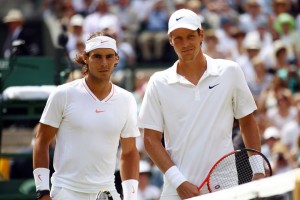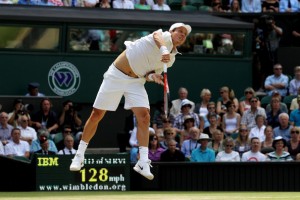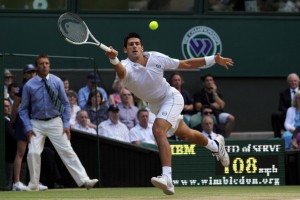Several Players Made A Wimbledon Splash
It’s too early to make predictions for the US Open; I think they at least have to play the Master’s Series events in Canada and Cincinnati before we do that. That’s especially true now that the defending champion of the event won’t be playing it due to injury, the player who has dominated the event in the past decade is slumping, and the man dominating the tour at the moment hasn’t been past the semis there.
But one thing we can do is look at the players who made a splash at this year’s Wimbledon, where they stand now, and what they need to do between now and then to be ideally prepared for the year’s last major. We start with none other than …
Rafael Nadal: After winning his eighth major and solidifying his stature as the game’s No. 1, we’ve seen a few, including (sigh) Chris Chase speculating about whether the Spaniard can match Roger Federer’s 16 Grand Slam wins.
Let me be emphatic: We should not be talking about this yet. It’s been five years since Nadal won his first major and he now has eight; he’s also been through a grocery list of injuries in that time and is having to schedule more and more carefully to avoid hurting himself. For now, let’s focus on a few other goals that more attainable but far from automatic.
First of all there’s the US Open, the one major he hasn’t won. This year is reminiscent of 2008 in more ways than one, now that Nadal has completed the Channel Slam for the second time and has firmly established himself as the best in the world. He fell short that year, losing to Andy Murray in the semis, saying later that the season had finally caught up with him and he had “nothing left.”
The US Open’s position as the last major of the year is always going to be tough for the player who works hardest on the court, and it’s surface is both faster than Nadal’s liking and least forgiving of his brittle joints.
This year is different from 2008 in one key respect: no Summer Olympics, meaning the Spaniard won’t be flying halfway around the world to win one more event before the Open starts, thus tiring himself out even more. That should work in his favor, but if he’s going to win the Open, it’ll probably need to be in the next couple of years, and need to be accomplished by weathering the storm of huge, flat hitter who pushes him to the distance.
Rafa’s goals for the near future are probably to grab that US Open trophy and break Bjorn Borg’s record at Roland Garros. That would give him three more majors, which would also equal Borg’s GS total. If he achieves that in the next couple of years, then we can start talking about the possibility of him equaling Pete Sampras total. Then, and only then, would I start talking about him matching Federer’s total, and that’s assuming the Swiss hasn’t added to it.
Tomas Berdych: In between the stretches in which he appeared completely unnerved by the setting of the Wimbledon final, the big Czech looked as though he were capable of really hurting Nadal with his serve. He probably could have made a great match of it had he saved his best performance for final Sunday and raised his game for the big occasion; in other words, if he’d been a bit more like Nadal.
It goes without saying by this point that Nadalian characteristics, especially mental ones, aren’t that common. Berdych’s success on the grass (and his semifinal appearance) on the clay of Paris have contributed to his having a ranking of No. 8, and should make him confident going into the summer hard court season (where he’s beaten Nadal twice).
New York fast courts should reward his serving and flat hitting, but will be hard on his slim physique. That bad news is that he’s never been past the fourth round there, but the good news is that he’d never been past the fourth of Roland Garros or the quarters of Wimbledon before this year.
Andy Murray: Britain’s No. 1 showed up at Wimbledon playing well, wasn’t overwhelmed by the occasion, and showed no fear of Rafael Nadal in the semis. In that sense, the fact that he lost in straight sets is all the more disheartening, as it appears he couldn’t have done much of anything better.
With Darren Cahill now at his side, the Scot has a lot of defense to play in North America, both in the sense that he’s defending points from his victory in Canada last year and must prove that he’s still a threat at the majors. Should he take good care of his body, though, a better result than last year’s fourth round showing at the Open should be a given, and it’s speed will make it more possible for him to take time away from guys with big forehands.
Novak Djokovic: After an early struggle with Oliver Rochus, who has a history of causing struggles for the Serb, Djokovic looked awfully good for four rounds, outdueling the hot grasscourt hand Lleyton Hewitt in the fourth and obliterating Andy Roddick’s conqueror Lu Yen-Hsun in the quarters.
Then, against Berdych in the semis, he simply didn’t have the answers. Berdych’s game had a lot to do with that, as he hits winners with ease, punishes weak serving, and offers few opportunities on his own service game.
What was most discouraging about that result, though, was how Djokovic responded to the loss of the second set. His body language suggested defeat was inevitable, and he surrendered his final break of service by double-faulting. True, he has struggled with his serve ever since Todd Martin made the odd choice of trying to tweak it, but the direction of that last double and his reaction to it suggested not so much a technical breakdown as indifference.
And the 6-3, 7-6, 6-3 scoreline was depressingly similar to his loss to Marat Safin at Wimbledon 2008 (6-4, 7-6, 6-2). This, combined with his early (but thankfully not recent) tendency toward withdrawals suggests that, once he falls behind, Djokovic is already thinking about his next match.
That mentality bodes more ill than his serving woes or breathing problems.
Lu Yen-Hsun: Kudos to the man from Taoyuan for his big fourth round win over Roddick. That said, whenever a little-known player scores a big win over a big name, there’s a simple test for predicting where they go from here: Listen to the commentators, the coaches, or the other players to see if they say this little-known player has the biggest or best (insert shot) or the best or most (insert attribute) on tour.
No one was saying anything like that about Lu, which made his beating at the hands of Djokovic easy to anticipate. His age (26) also suggests that he won’t be back.
I’ll be back later to give similar treatment to players who had a disappointing Wimbledon.




